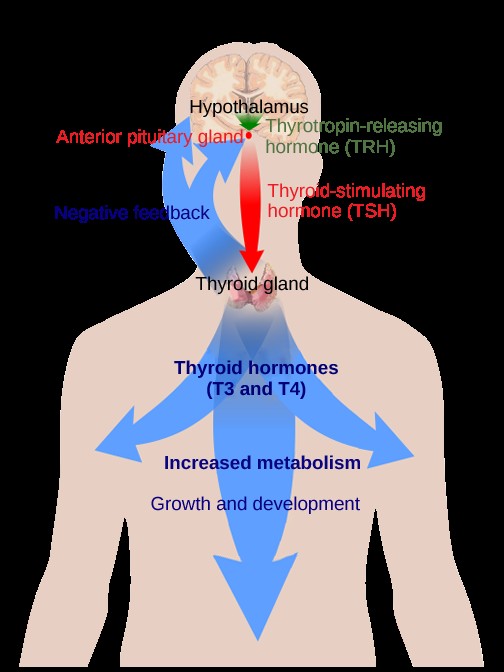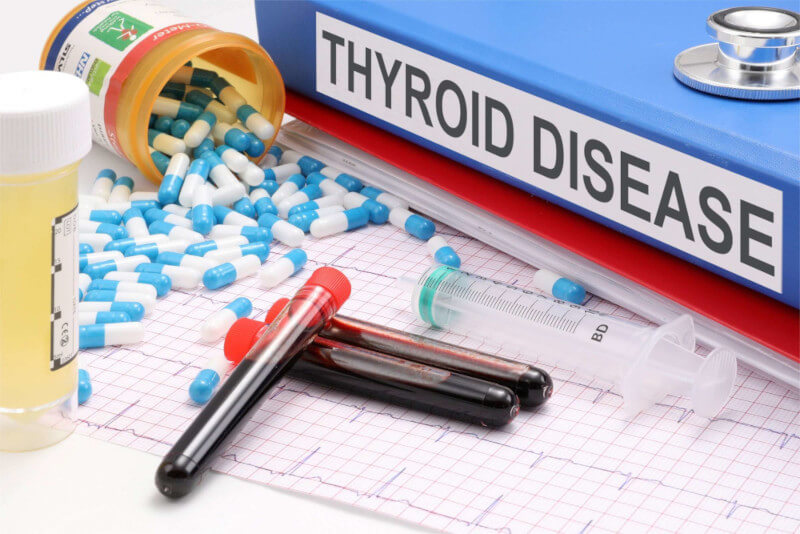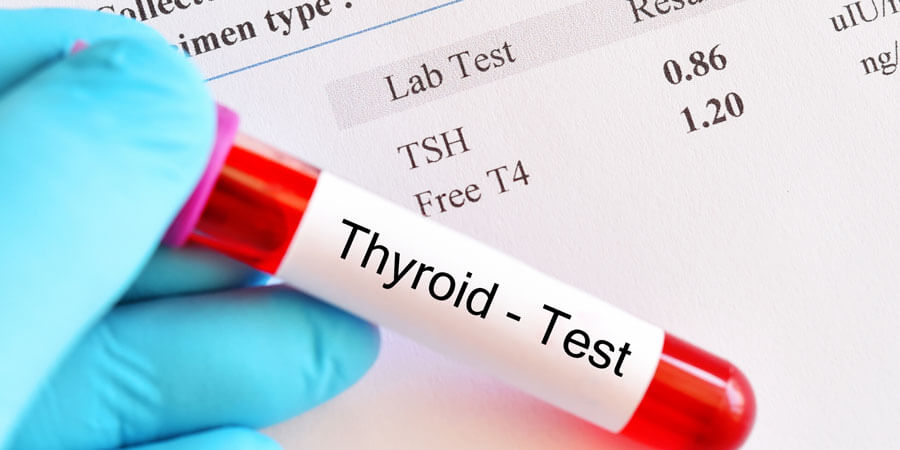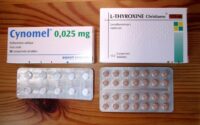Thyroid and Lipedema Diseases: Life Out of Balance – Part 1
Life is about balance. When your life or your body is out of balance it opens the door to disease and chronic conditions. Detecting the imbalances can be overt or symptomless until the condition is in a serious state. One key area of imbalance that is developing rapidly in the United States is thyroid disease, with over 20 million people affected and growing rapidly! And this problem seems to be particularly escalating in women with Lipedema.
Thyroid conditions can wreak havoc throughout the body and contribute to numerous problems already exacerbated in people with Lipedema, such as obesity, fluid retention, insulin resistance and general feelings of unwellness. It is important to properly care for the fat and lymphedema imbalances we see on the outside of the body, but we cannot ignore the hidden imbalances that may be plaguing us on the inside. Let’s take a closer look at thyroid function and why you may need to examine your thyroid for proper functionality.
What is the Thyroid and Why is it Important?
The thyroid is a small butterfly-shaped gland in the lower neck below the Adam’s apple and responsible for producing, monitoring and managing thyroid hormones used throughout the body. The thyroid gland wraps around the trachea and consists of two lobes connected by a small bridge of tissue called the isthmus. The thyroid gland also houses four rice-sized glands on its top surface called parathyroid glands.
Understanding the Endocrine System
The thyroid gland is part of a network of glands called the Endocrine system that produce, monitor and manage hormones throughout the body. It should be noted these glands and hormones are interconnected so disruptions in one gland can impact the function of one or more glands. Endocrine glands include:
- Hypothalamus – located in the brain, it works with the pituitary gland on the release of requested hormones
- Pituitary – located in the brain, it is considered the “master gland” as it regulates levels in glands such as the thyroid, adrenals and pancreas
- Thyroid – located in the neck, it plays a key role in metabolism, energy production, growth and heart rate
- Adrenals – located on top of the kidneys, it regulates stress response
- Pancreas – located behind the stomach, it regulates insulin and glucagon in managing blood sugar
- Ovaries (women) – located above the uterus it manages estrogen and progesterone production and function
- Testes (men) – manages testosterone and other males reproductive functions
- Pineal – located in the brain, it manages melatonin, which manages the sleep-wake cycles
Here is a very informative podcast on thyroid dysfunction and the whole body approach to cause and repair. In it, Dr. Filomena Trindade, a renowned expert in functional medicine, speaks to the “hormonal symphony” and interconnectedness of endocrine system.
What Does the Thyroid Do?

The thyroid is one of the most important glands in the body and controls many facets of body function. You CANNOT live without a functioning thyroid unless you take lifelong hormone replacement medication(s), so it is imperative you keep a close eye on your thyroid health!
The thyroid produces two main hormones, thyroxine (T4) and triiodothyronine (T3). The T4 hormone is an inert storage hormone that stands by waiting for your brain to tell your thyroid you need more T3, the active hormone, to be used within all the cells of your body. Both T4 and T3 circulate throughout your blood stream until they are directed to be either converted or used by the body. (I won’t go into the details until the next post.)
Your thyroid gland is in constant communication with cells and your hypothalamus and pituitary glands in a feedback loop to monitor and adjust hormone levels as needed throughout the body. It is a sophisticated process, which also means there are more components to monitor to ensure the full feedback and production process is working effectively.
What is So Important About the Thyroid?
The thyroid is like the “man behind the curtain” in the Wizard of Oz. It is responsible for so many key functions throughout the body that disruptions in any one of these areas can be quite noticeable. Note that thyroid problems can take years to develop and sometimes it may be weeks or months to notice something is wrong, especially if you have other chronic conditions such as Lipedema that may be masking the thyroid issue.
Probably the most notable function is regulating metabolism, which is responsible for burning calories and producing body heat. You basal body temperature can be an early indicator if your thyroid is experiencing problems. (I will explain further in the next article on diagnosing and treating thyroid conditions.) If you’re having thyroid hormone imbalances then your metabolism may not be working well causing you to gain weight, particularly around the belly area and probably struggle to lose the belly fat.
All the cells in your body need to use the T3 that is either produced by the thyroid, or converted from T4, to manage your body’s energy levels. When the cells cannot uptake or properly use the T3 you may notice an increase in fatigue and sluggishness.
Thyroid imbalances, particularly hypothyroidism (“hypo” meaning underactive), can severely impact your digestive health. It can slow down digestion creating dysbiosis and motility problems resulting in constipation or diarrhea, nausea, vomiting, bloating, gas and acid reflux issues. If not treated quickly, it can lead to more serious gastrointestinal issues such as Small Intestinal Bacteria Overgrowth (SIBO), Exocrine Pancreatic Insufficiency (EPI) and gallbladder dysfunction.
Thyroid conditions, particularly hypothyroidism, can affect the lymphatic system creating sluggish movement of lymphatic fluid and drainage. This is most evident with swelling in the neck and limb areas, which is coincidentally the same areas affected by Lipedema or Lipo-Lymphedema. Not surprisingly, lymphatic health is directly connected to digestive and thyroid health. When one or more are out of balance the others will fail too. Ayurvedic medicine has recognized this critical connection and treatment long before Western medicine.
Thyroid hormones also affect the cardiovascular system helping to regulate heart rate and blood pressure. Thyroid hormonal imbalances can lead to atrial fibrillation (AFib), a faster irregular heartbeat. The development of AFib increases the heart rate, which increases the risk of blood clot development. These blood clots can travel to the brain causing a possible stroke. (1)
Thyroid hormones are necessary for bone growth and brain development in children. It should be noted a mother’s thyroid health should be optimized and closely monitored during pregnancy to ensure proper development of the baby and its future thyroid function.
Thyroid Conditions and Disease
Thyroid dysfunction can be a tricky condition to diagnose. By the time you feel most of the serious symptoms you are probably well entrenched in the condition and will require medical attention. This somewhat silent and often overlooked glandular problem is rapidly growing in the United States, particularly in women.
Thyroid Symptoms
Hypothyroidism and Hyperthyroidism (meaning “over” active) have differing symptoms. However, some symptoms overlap such as fatigue, thinning hair, menstrual cycles irregularities and pregnancy complications. This is why performing a FULL thyroid panel of tests (see below) and sharing your symptoms with your doctor is important in determining if a problem exists. (2)
Hypothyroid Symptoms:
- Fatigue
- Slow metabolism
- Weight gain
- Cold intolerance
- Decreased sweating
- Brittle nails
- Puffy face
- Reduced heart rate
- Irregular or heavier menstrual periods
- Constipation (although diarrhea is also common)
- Painful joints and muscles (fibromyalgia type pain)
- Mood swings and depression
- Insomnia
- Loss of the outer third of eyebrows
Hyperthyroid Symptoms:
- Fatigue
- Increased metabolism
- Weight loss
- Heat intolerance
- Increased sweating
- Increased heart rate
- Thicker flaking nails
- Tremors or nervousness
- Anxiety and irrability
- Loose stools
- Lighter menstrual periods
- Bulging eyes or vision issues
- Sleep problems
How to Get Started With an Assessment
It will largely depend on your healthcare structure, but you may need to start with a visit to your primary care physician (PCP) who may prescribe some thyroid tests and assess your symptoms. From there you may be referred to an Endocrinologist, a doctor specializing in thyroid and other endocrine functions. Depending on the presentation of your symptoms and family history they will order thyroid tests to get a better picture of how your system is functioning. It is imperative your Endocrinologist run the FULL thyroid panel of tests along with the FULL list of supporting vitamins and minerals (see comprehensive list below).
Some people may prefer a Naturopathic doctor for assessment and potential treatment. If you choose this route, make sure your Naturopath has sufficient Endocrinology training and experience. This functional knowledge is critical as they will need to apply both Naturopathic and Allopathic treatments to manage any potential thyroid conditions. Again, make sure they run the FULL thyroid panel of tests along with the FULL list of supporting vitamins and minerals (see comprehensive list below), It is imperative to get a baseline established to monitor ongoing thyroid changes.
Prevalence and Impact of Thyroid Disease
According to the American Thyroid Association, more than 12 percent of the U.S. population will develop a thyroid condition during their lifetime. Here are additional facts of thyroid disease:
- An estimated 20 million Americans have some form of thyroid disease. (Estimates are now closer to 24 million Americans today.)
- Up to 60 percent of those with thyroid disease are unaware of their condition.
- Women are five to eight times more likely than men to have thyroid problems.
- One woman in eight will develop a thyroid disorder during her lifetime.
- Most thyroid cancers respond to treatment, although a small percentage can be very aggressive.
- The causes of thyroid problems are largely unknown.
- Undiagnosed thyroid disease may put patients at risk for certain serious conditions, such as cardiovascular diseases, osteoporosis and infertility.
- Pregnant women with undiagnosed or inadequately treated hypothyroidism have an increased risk of miscarriage, preterm delivery, and severe developmental problems in their children.
- Most thyroid diseases are life-long conditions that can be managed with medical attention. (3)
Common Thyroid Conditions and Diseases
This is a list of the most common thyroid problems and doesn’t include some of the rarer conditions:

- Nodules – lumps or growths on the thyroid that can be either benign or malignant; may be felt with palpitation or even pressure against the trachea or esophagus
- Goiters – an enlargement of the thyroid gland which can grow in size to protrude out the neck to a baseball size lump
- Cancer – malignant nodules or goiters can spread to the thyroid tissue and even metastasize outside the gland elevating the need for radiation, surgical or other treatments (there are 4 cancers: papillary (most common), follicular, Medullary and Anaplastic (most rare))
- Hypothyroidism – underactive thyroid activity caused by insufficient production of hormones leading to slower metabolic rates
- Hyperthyroidism – overactive thyroid activity caused by overproduction of hormones leading to higher metabolism rates
- Hashimoto’s Disease– underactive thyroid activity caused by an autoimmune condition where the body attacks its own thyroid tissue (most common type of hypothyroidism in the United States)
- Graves’ Disease – overactive thyroid activity caused by an autoimmune condition where the body attacks its own thyroid tissue (can be accompanied by eye bulging or vision related problems)
- Postpartum Thyroiditis – thyroid inflammation following child delivery that can lead to hypothyroidism
- General Thyroiditis – inflammation of the thyroid from a viral or bacterial infection
It should be noted thyroid problems can be hereditary and run in families. Gather information about your family history of thyroid issues before you see your doctor.
Abnormally high estrogen levels, present in pregnancies, in the use of birth control pills, estrogen replacement hormone therapy or naturally high estrogens in the body, can increase the levels of binding proteins thereby causing the decrease of free T4 and T3 hormone levels. This affects the body’s ability to uptake these hormones, particularly T3, for cellular use.
You can also have more than one of the conditions listed above. For instance, it might be common to have nodules and cancer or to have nodules, cancer and hypothyroidism. Thorough testing is required to identify the potential of any of the conditions listed above.
How to Fully Test for Potential Thyroid Conditions
If you suspect thyroid problems you are going to want to test for BOTH the full thyroid panel of tests AND the associated vitamins and minerals needed to support T4 to T3 conversion. You will need to see an Endocrinologist or Naturopath with Endocrinology education to properly diagnose and treat you. It is IMPERATIVE you get the FULL suite of tests performed, especially if this is your first visit to get the BEST overview of your thyroid function. Do NOT settle for anything less as many doctors will try to diagnose and treat based on very minimal information, which can be misleading.
Thyroid Panel Tests

- Thyroid Stimulating Hormone (TSH) – indicates how well the pituitary gland is telling the thyroid to produce thyroid hormones
- Total T4 – measure the total amount of T4 circulating in the blood stream
- Free T4 – measure the unbound free T4 available for conversion
- Total T3 – measures the total amount of T3 circulating in the blood stream
- Free T3 – measure the unbound free T3 available for uptake by cells
- Reverse T3 – inactive form of T3 that usually indicates inflammation, stress or illness within the body reducing the thyroid’s metabolism during illness recovery
- Thyroid Peroxidase (TPO) Antibodies – indicates the presence of an autoimmune condition such as Hashimoto’s or Graves disease
- Thyroglobulin (Tg) Antibodies – indicates an autoimmune condition that affects the production and effective management of the thyroglobulin protein
It is highly recommended you get this ENTIRE panel run at your first visit to establish your baseline. If you are diagnosed with a thyroid condition and require treatment, frequent repeat testing compared to your baseline will help determine how well your thyroid is responding to treatment
Supporting Thyroid Vitamin and Minerals Tests
The following are vitamins and minerals required to maintain the thyroid gland, T4 to T3 conversion, cellular activation of T3, and overall body health. A deficiency in any of these areas can indicate your thyroid function is impaired even is your TSH levels are in range.
- Selenium
- Iron/Ferritin
- Iodine
- Vitamin D
- Zinc
- Magnesium
- Vitamin A
- Vitamin B12
- Vitamin E
Additional Thyroid Tests
Depending on your symptoms, treatment and previous tests you may need additional thyroid testing. Examples of these tests include:
- Ultrasound – helps determine the size and shape of identifiable nodules, surrounding lymph node involvement or presence of any residual thyroid tissue if you have had a thyroidectomy
- Fine Needle Aspiration (FNA) – removes cellular matter from the thyroid and any nodules to closely examine them for any abnormalities or the presence of malignancy (uses a TIRADS score to determine the level of risk of thyroid malignancy in nodules)
- Thyroid Scan – uses a small amount of radioactive iodine to get the best shape, size and position of the thyroid gland along with any nodules
- Thyroglobulin test – measures the level of thyroid protein thyroglobulin in the blood as an indicator thyroid tissue is still present in the body (should not register if you have had a thyroidectomy)
- Lipid Panel – Thyroid hormones play a crucial role in regulating cholesterol metabolism. Hypothyroidism can lead to increased levels of “bad” cholesterol (LDL) and decreased levels of “good” cholesterol (HDL). Hyperthyroidism can lead to decreased levels of LDL and HDL.
Thyroid Temperature and Pulse Tracking Charting
In the 1940s Dr. Barnes pioneered tracking your basal body temperature (BBT) daily to see if there was a relationship between low BBT and underactive (or overactive) thyroid function. This test has expanded to be used in fertility tracking but is still one of the tools clinician’s use to help evaluate your thyroid function. It is easy to complete and you can do this at home to supplement other tests being used to evaluate your overall thyroid health.
How does it work? Use the Thyroid Daily Tracking sheet to record your temperature and pulse four times per day and generate a daily average number. After a week transfer your daily average numbers to the Thyroid Tracking Chart so your clinician can can see how your temperature fluctuates daily and over time. Here are the forms you can use to do your tracking.
- Daily temperature and pulse tracker
- Thyroid temperature tracking chart
- Thyroid temperature tracking chart sample
Save your forms and take them to your clinician for review.
Lipedema and Thyroid Conditions

A 2021 study in Sweden of 245 women with Lipedema (aka Lipoedema in Europe), which included stages 1 (11%), 2 (35%) and 3 (54%), asked them to disclose any co-occurring conditions with their Lipedema. Of the 14 documented co-occurring conditions the fourth most common reported condition was hypothyroidism. “Nearly one-fifth of all women had hypothyroidism, which was more common in more progressive stages, with it affecting 23.3% of women in lipoedema stage 3 compared to 8.7% of those in stage 1.” (4)
A 2022 study of 65 Italian women with Lipedema and obesity were evaluated for related hypothyroidism. Researchers found that 22 women had Lipedema stage 1, 25 women had stage 2, 15 women had stage 3 and three women had stage 4. More than 46% of these women were considered obese (BMI>30). They discovered more than 41% of the women presented with hypothyroidism. Further they found that hypothyroidism increases with the Lipedema stage: 18.2 % in stage 1, 40 % in stage 2, 66.7 % in stage 3, 100 % in stage 4. The findings indicate a direct correlation between women with Lipedema and obesity and the prevalence of hypothyroidism. Researchers recommend “[o]besity and thyroid dysfunction should be evaluated in patients with lipedema, especially because for the possible worsening effect on the evolution of lipedema.” (5)
We are seeing rapidly increasing rates of thyroid conditions rates in the United States and these increases are also being seen in those with Lipedema. Thyroid issues can be influenced by other hormone imbalances, such as estrogen, diet, existing autoimmune conditions and genetics. Lipedema usually appears or intensifies during hormonal shifts, particularly caused by estrogen, such as during puberty, pregnancy and menopause.
Many people with Lipedema have both documented and undocumented estrogen hormone imbalances, which can have a direct impact on thyroid hormone production and availability for cells in the body. The two most common estrogen imbalance conditions are estrogen dominance and Polycystic Ovarian Syndrome (PCOS) where estrogen operates unopposed by progesterone. Unfortunately, hypothyroidism can also contribute to estrogen dominance, so unchecked hormonal imbalances can negatively impact other parts of the endocrine and reproductive system.
The presence of one autoimmune condition in the body increases the likelihood of developing another one. Frequently those with celiac disease, rheumatoid arthritis, or lupus also develop Hashimoto’s or Graves’ disease. (Note this does not exclude all other autoimmune conditions.) Interestingly, if you suspect or are diagnosed with Hashimoto’s disease you may find a phenomenon known as molecular mimicry at play. Gluten proteins share a very close resemblance to thyroid tissue and your immune system may mistakenly attack your thyroid believing it is responding to gluten. If this is the case you should be tested for non-celiac gluten sensitivity or allergy (celiac disease) in addition to monitoring your thyroid antibody levels.
Informally, I have observed many people in my Lipedema and thyroid support groups voicing concerns about suspecting or being diagnosed with some of the aforementioned conditions. The presence of autoimmune conditions, estrogen issues, dietary issues, leaky gut or genetics tend to uncover hidden thyroid problems. Remember, the body must be in balance to work properly. A problem in one area likely means something may be developing in another area, particularly in the endocrine system. More studies need to be done in the Lipedema community to study the prevalence of thyroid conditions and its impact on fat development, lymphatic function and metabolic systems.
Summary of Thyroid and Lipedema Diseases: Life Out of Balance
When life is out of balance it opens the door to disease and chronic conditions. These conditions, particularly thyroid problems, can wreak havoc throughout the body causing issues in other systems. This can include digestive health (stomach, colon, pancreas and gallbladder), insulin management, adrenal health, reproductive health, cardiovascular health, energy production, and lymphatic function to name a few. It can also exacerbate problems in other conditions, such as Lipedema, lymphedema, and obesity already experienced by people in this community.
Thyroid conditions and diseases are rapidly on the rise in the United States with many people not even knowing they have one or more thyroid issues. Hopefully this article will help people identify symptoms of common thyroid conditions and the need to perform a FULL thyroid test panel AND supporting vitamins and minerals tests to confirm or eliminate any problems. Thyroid conditions can also be genetic so check with family to see if anyone has been diagnosed or suspected of having a thyroid disease.
Studies are starting to emerge that show a relationship between Lipedema, obesity and thyroid conditions, especially hypothyroidism. This further demonstrates the relationship between these three conditions worsening as the Lipedema stage increases. More studies need to be done to examine these relationships. The hope would be early suspicion and diagnosis could reduce the prevalence of these conditions or the patients could begin treatment earlier before more serious issues develop. This would then allow people to put their life and body back into balance.
My Personal Story: Hypothyroidism runs in my maternal family but I was unable to connect the dots until two years ago at age 60. I had several nodules on both lobes and the isthmus, one of them pressing against my trachea and esophagus. In 2021 one nodule tested 90% malignant and I had to make a very difficult decision (especially during the COVID pandemic) on treatment. In October 2021 I had a thyroidectomy with pathology showing papillary cancer in nodules not previously tested, several additional large nodules and undiagnosed Hashimoto’s disease. I now live on both T4 and T3 medications for life. Over the last 3.5 years my hypothyroidism significantly worsened to the point I became a “Zombie” barely able to function on my own. I switched to a Naturopath with Endocrinology training and we have begun the long process of rebalancing my thyroid hormones. This is still in progress and I will elaborate more in the next article. So far it is making a HUGE difference in my quality of life!
Stay tuned —> Thyroid and Lipedema Diseases: Life Out of Balance – Part 2 where I discuss diagnosing thyroid conditions and diseases
To Your Improved health!
References:
- (1) American Thyroid Association – Clinical Thyroidology for the Public: Thyroid and the Heart
- (2) VeryWell Health – Hypothyroidism vs. Hyperthyroidism: What’s the Difference?
- (3) American Thyroid Association – General Thyroid Information
- (4) BMC Women’s Health – Women with lipoedema: a national survey on their health, health-related quality of life, and sense of coherence
- (5) Bioscientifica Abstracts (Endocrine Abstracts) – Hypothyroidism and obesity in a population of Italian women with lipedema and correlation with the clinical stage
Resources:
- American Thyroid Association
- Thyroid Patients Canada
- British Thyroid Association
- Australian Thyroid Association
- Endocrine Society – US
Books:
- The Thyroid Fix: Reduce Fatigue, Lose Weight, and Get Your Life Back – Dr. Shawn Soszka
- Stop the Thyroid Madness: A Patient Revolution Against Decades of Inferior Treatment – Janie Bowthorpe
- The Thyroid Connection: Why You Feel Tired, Brain-Fogged, and Overweight — and How to Get Your Life Back – Amy Myers
- Hashimoto’s Protocol: A Groundbreaking Prescription to Reverse Symptoms, Heal Autoimmune Damage, and Reclaim Your Life with Personalized Detox Plans, Nourishing Recipes, and Proven Treatment – Isabella Wentz
- Recovering with T3: My Journey from Hypothyroidism to Good Health using the T3 Thyroid Hormone (Recovering from Hypothyroidism) (Book 1) – Paul Robinson
- The CT3M Handbook: More on the Circadian T3 Method and Cortisol (Recovering from Hypothyroidism) (Book 2) – Paul Robinson
- The Thyroid Patient’s Manual: From Hypothyroidism to Good Health (Recovering from Hypothyroidism) *Book 3)- Paul Robinson



How can I find a doctor who understands lipedema, thyroid and menopause? Typical western medicine doctors haven’t helped me. Thank You
Hi Hillary,
Unfortunately, Western medicine is more of a silo-based medicinal approach where you may find expertise in one system and perhaps knowledge in a common co-occurring system. I had to search for Naturopathic or Functional Medicine doctors to find one who understands the systemic approach to body functions. I would recommend if you go this route to search for a doctor that specifically has thyroid or Endocrinology training and experience. Many Naturopaths have a good broad knowledge that includes a cursory understanding of thyroid function. However, if you suspect or are diagnosed with a thyroid condition you should look for a specialist in the Naturopathic realm. My doctor specifically advertises and has the necessary training and experience in complex thyroid conditions. He also has enough knowledge about my reproductive hormones to treat me. He is coming up to speed quickly on Lipedema. I feel blessed to have found him! He literally saved my life!
Have you tried to search online for a Naturopath doctor with thyroid experience in your area? During your vetting process make sure they are familiar and not reluctant to work with allopathic medications. You will also need to make sure they are licensed to treat you in your state. My doctor is only licensed in Oregon and Washington.
I wish you well in your search!
Esther
My husband was diagnosed with Hashimoto’s thyroiditis four years ago. For over two years, we relied on prescription medications and therapies, but unfortunately, his symptoms continued to worsen. His energy, focus, and overall strength declined, and everyday life became increasingly difficult.Last year, out of desperation and hope, we decided to try an herbal treatment program from NaturePath Herbal Clinic. Honestly, we were skeptical at first, but within a few months of starting the treatment, we began to notice real changes. His energy improved, his clarity of mind returned, and he regained a surprising amount of balance and vitality.Incredibly, he also regained much of his independence and confidence. It’s been a life-changing experience he feels more like himself again, better than he had in years.If you or a loved one is struggling with Hashimoto’s thyroiditis, I truly recommend looking into their natural approach. You can visit their website at http://www.naturepathherbalclinic.com
Hi Evelyn,
Thank you for sharing your story. I am glad to hear your husband has responded so well to a naturopathic complement to his allopathic medicine. More people are finding they need to supplement their thyroid care to address the root cause(s) of their condition or disease. (I found that out personally this year myself.) Some people may recover successfully with conventional medicines but others need additional care, which can be found in eastern medicine and ayurvedic medicine options. Adjusting your diet can also help improve thyroid function.
I will reiterate that seeking care from non-western medicine sources should be from a practitioner with thyroid or endocrinology training or certification. Treating thyroid conditions can be complex and this is an area you need treatment from a skilled professional.
I wish your husband continued healing and improved health from his new care team!
Esther
Excellent article . Thank uou
Thank you, Judith. Glad you found it useful. Don’t forget to read the second part on diagnosing thyroid conditions – https://morethanfat.com/thyroid-and-lipedema-diseases-life-out-of-balance-part-2 . I will be publishing the third installment on treatment options soon.
Esther